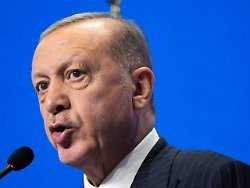Trip to Kiev
Erdogan wants to give the mediator
2/3/2022 4:53 am
Ankara maintains good relations with Kiev, but also with Moscow. Turkey depends on Russian gas and tourists. As a result, the country is caught between the stools in the Ukraine conflict. Now Erdogan travels to Kiev. What to expect from the visit?
Amid high tensions in the Ukraine conflict, diplomatic efforts to find a peaceful solution continue. Turkish President Recep Tayyip Erdogan plans to fly to Kiev on Thursday for talks with his Ukrainian colleague Volodymyr Zelenskyy. In addition to trade relations, according to Turkish information, the crisis between Ukraine and neighboring Russia should also be discussed. French President Emmanuel Macron also wants to continue to mediate in the conflict with talks.
Turkish President Erdogan has repeatedly offered to act as mediator between Ukraine and Russia. While Kiev accepted the offer, the reaction from Moscow was rather muted. NATO member Turkey maintains good relations with both Ukraine and Russia. Erdogan described a possible Russian intervention as “not realistic” and a wrong step. To the anger of the Kremlin, Turkey has repeatedly criticized the Russian annexation of Crimea in 2014 and repeatedly insisted on Ukraine’s independence – also because the Muslim minority of the Crimean Tatars has historically been closely linked to their southern neighbor on the Black Sea.
For example, Ankara supplies Kiev with combat drones. In October last year, Kiev used one in the contested east of the country for the first time. As the Organization for Security and Cooperation in Europe (OSCE) announced on Thursday night, Ukrainian forces threatened OSCE observers in eastern Ukraine to shoot down an organization drone.
The Kremlin recently welcomed talks between Turkey and Ukraine. It is unclear when Erdogan and Putin will meet again. Turkey has a strong interest in good relations with Moscow: Most tourists come from Russia, and Moscow is also the largest supplier of gas. In 2020, almost 34 percent of gas imports came from there. Turkey’s policy is a balancing act, says Ukraine expert and political analyst Hüseyin Oylupinar. Turkey has an interest in maintaining the status quo in the region. Ankara sees an independent Ukraine as a counterweight to Russia. At the same time, there is no interest in NATO becoming stronger in the region if Ukraine joins.
NATO welcomes US troop deployment
Meanwhile, tensions await how the Kremlin will react to the US-announced transfer of around 2,000 soldiers to Europe. Russia’s Deputy Foreign Minister Alexander Grushko has already spoken of a “destructive step”. This narrows the scope for political decisions. In contrast, NATO Secretary General Jens Stoltenberg welcomed the planned transfer. This strengthens the deterrence and defense of the alliance. The US Department of Defense had announced that it would send around 2,000 soldiers to Europe – 300 of them to Germany. 1700 forces are to be transferred to Poland. In turn, 1,000 American soldiers would be sent to Romania from the Federal Republic.
US President Joe Biden said the troop deployment was in line with what he had told Russian President Vladimir Putin from the start of the crisis. Pentagon spokesman John Kirby said there was “no sign of de-escalation.” “We believe that Putin has great military potential. He is constantly expanding his options,” Kirby said.
Macron talks to Putin
Meanwhile, diplomatic attempts to find a peaceful solution to the conflict continue. Chancellor Olaf Scholz announced that he would be traveling to Moscow “soon” for a meeting with Putin. French President Emmanuel Macron wants to call Putin again this Thursday. A talk with the Ukrainian President Selenskyj is also pending. Macron and Putin maintain close contacts in the conflict because Paris, together with Paris, has been mediating in the Ukraine conflict for years.
The Frenchman also spoke to Biden on the phone late Wednesday night. According to the White House, both reiterated their support for Ukraine and “high economic costs” in the event of a Russian invasion of Ukraine. However, the White House slightly changed its choice of words in the Ukraine crisis and no longer wants to speak of an “imminent” Russian invasion of the country. White House spokeswoman Jen Psaki said the decision was made to stop using the term because it sends a message that was not intended: “which is that we know that President Putin has made a decision.”
